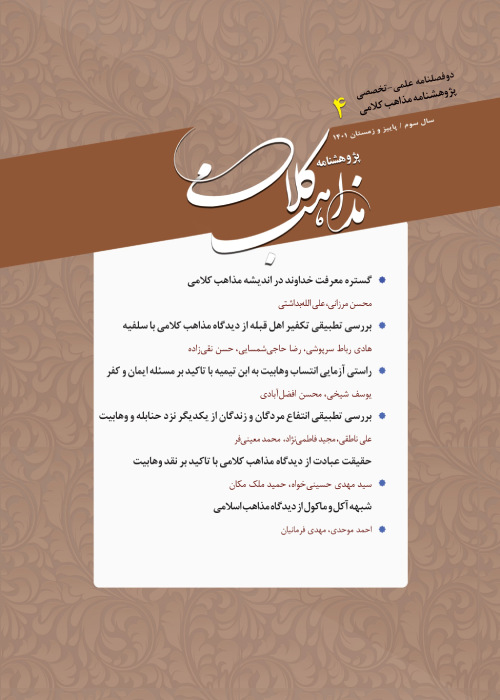Salafism according to Sheikh Yusuf al-Qaradawi
Author(s):
Article Type:
Research/Original Article (بدون رتبه معتبر)
Abstract:
Sheikh Yusuf al-Qaradawi is a scholar who advocates proximity among Islamic denominations. He is affiliated to a moderate group within Muslim Brotherhood. Perhaps, it is a speculative and groundless claim to consider him as one of Salafi Sunni scholars; if we look at his views in ideological and theological areas, we can find certain constituents signifying his tendency to Salafism. When it comes to exegesis of the divine attributes, he considers somehow the school of Salafism as acceptable. He affirms Hasan al-Banna's opinion in introducing the school of delegation as a Salafist thought allowing effortless and wholesome interpretations in this area, something facing extensive criticism from the Salafists. While explaining al-Tawhid al-Rububi (or tawhid of lordship) he accepts somehow the Salafists' explanation of the same concept but contrary to Salafists, he does not consider tawassul (seeking means of nearness to Allah) a belief-related matter. Of course, because of sadd al-zaray'e (blocking the means), he does not term it as shirk (polytheistic). The important point is that because of some social observations, Islamic societies and proximity-seeking thought or owing to his Salafist theoretical foundation in explaining monotheism, al-Qaradawi refrains from excommunicating Muslims who adhere to certain rituals such as istighatha (beseeching others for help). This is something that can be traced back to how al-Qaradawi has been implementing the requirements of tawhid of sovereignty. Like Muhammad Qutb, he has, albeit more softly, refrained from explicating the requirements of tawhid of sovereignty which, at times, can lead to excommunicating a ruler who has been designated by someone than Allah. When it comes to innovation (bid'ah) and its manifestations, al-Qaradawi has been too much strict, though Salafists have not reconciled themselves with some of his beliefs such as the permissibility of moderate Sufism, tendency to Ash'arite School, praising democracy and tolerance in rebelling against a ruler. He has, therefore, been accused of compromising on religious beliefs. On the other hand, al-Qaradawi's staunch belief in the openness of the gate of ijtihad and his strong defense of Banu Umayyah are considered to be some of the manifestations of his Salafist approach. Finally, it can be said that al-Qaradawi has relatively accepted the theological foundations of contemporary Salafism though the contemporary Salafi dogmatism makes it difficult to include him among the full-fledged Salafists.
Keywords:
al-Qaradawi , Salafsim , Theology , beliefs
Language:
Persian
Published:
Theological religions Research Journal, Volume:1 Issue: 1, 2021
Pages:
53 to 89
https://magiran.com/p2596326
دانلود و مطالعه متن این مقاله با یکی از روشهای زیر امکان پذیر است:
اشتراک شخصی
با عضویت و پرداخت آنلاین حق اشتراک یکساله به مبلغ 1,390,000ريال میتوانید 70 عنوان مطلب دانلود کنید!
اشتراک سازمانی
به کتابخانه دانشگاه یا محل کار خود پیشنهاد کنید تا اشتراک سازمانی این پایگاه را برای دسترسی نامحدود همه کاربران به متن مطالب تهیه نمایند!
توجه!
- حق عضویت دریافتی صرف حمایت از نشریات عضو و نگهداری، تکمیل و توسعه مگیران میشود.
- پرداخت حق اشتراک و دانلود مقالات اجازه بازنشر آن در سایر رسانههای چاپی و دیجیتال را به کاربر نمیدهد.
In order to view content subscription is required
Personal subscription
Subscribe magiran.com for 70 € euros via PayPal and download 70 articles during a year.
Organization subscription
Please contact us to subscribe your university or library for unlimited access!


